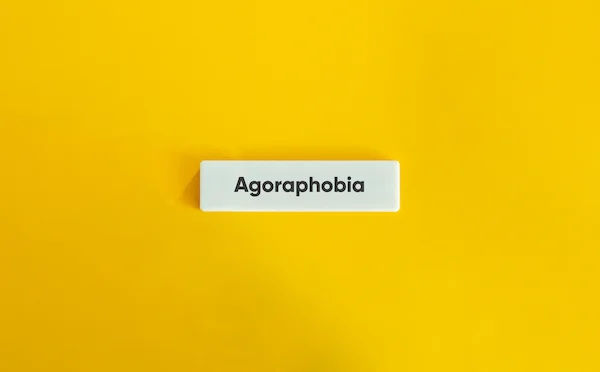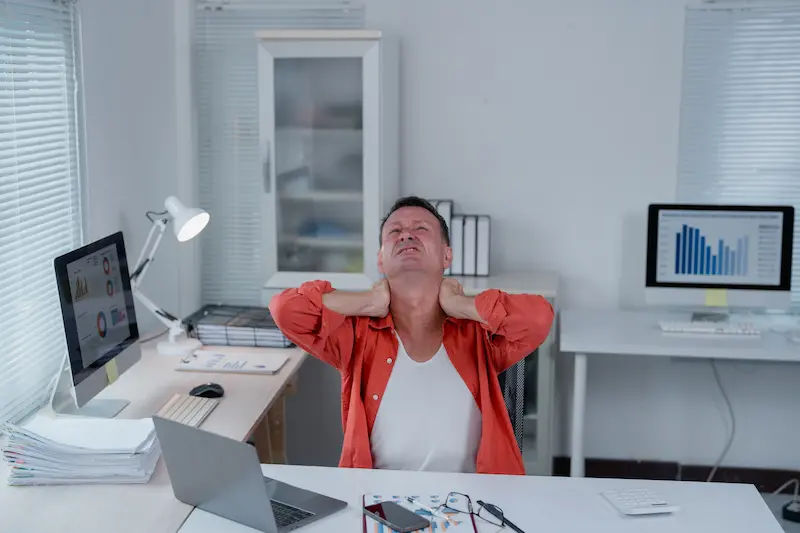Understanding Agoraphobia: Symptoms, Causes, and How to Cope
Learn about agoraphobia, its symptoms, causes, diagnosis, and effective coping strategies. Discover treatments like CBT, exposure therapy, and self-help techniques for recovery.

Written by Dr. Mohammed Kamran
Reviewed by Dr. Dhankecha Mayank Dineshbhai MBBS
Last updated on 13th Jan, 2026

Introduction
Imagine feeling an intense, overwhelming wave of fear at the thought of leaving your home. The local grocery shop, a crowded cinema, or even a standing-room-only queue feels like an impossible challenge. This is the reality for individuals living with agoraphobia, a complex anxiety disorder that is often misunderstood as simply a "fear of open spaces." In truth, it's a condition characterised by a deep-seated fear of situations where escape might be difficult or help wouldn't be available if things go wrong. This fear leads to avoidance behaviours that can severely restrict a person's life. This article will serve as a comprehensive guide, breaking down what agoraphobia truly is, exploring its symptoms and root causes, and outlining the most effective evidence-based treatments and coping strategies. Our goal is to provide clarity, hope, and a pathway towards reclaiming your life from anxiety.
What is Agoraphobia? More Than Just a Fear of Open Spaces
Agoraphobia is an anxiety disorder where you fear and often avoid places or situations that might cause you to panic, feel trapped, helpless, or embarrassed. The classic perception of a fear of open spaces is just one facet. People with agoraphobia frequently fear:
- Using public transport (buses, planes, trains)Being in open spaces (car parks, bridges)
- Being in enclosed spaces (shops, cinemas)
- Standing in line or being in a crowd
- Being outside of the home alone
The core of the fear isn't the place itself, but the anticipation of having a panic attack or other debilitating symptoms in that environment and not being able to get to safety or receive help.
The Agoraphobia-Panic Disorder Connection
While they can occur separately, agoraphobia is often, but not always, associated with panic disorder. Many people develop agoraphobia after experiencing one or more panic attacks. They begin to fear another attack and thus avoid places where an attack has occurred or where they believe it would be difficult to escape. This creates a vicious cycle: fear of an attack causes anxiety, which can actually trigger an attack, reinforcing the avoidance behaviour.
Recognising the Signs: Symptoms of Agoraphobia
Symptoms of agoraphobia can be psychological, behavioural, and physical, often mirroring those of a panic attack when confronted with a feared situation.
Consult a Psychiatrist for Personalised Advice
Psychological and Behavioural Symptoms
These are the primary indicators and include:
- Fear of leaving home alone: A pervasive anxiety about being in public without a companion.
- Avoidance of triggering situations: Actively steering clear of crowds, public transport, or queues.
- Need for a "safe person": Feeling that you need to be with someone you trust to face public situations.
- Fear of losing control: In public, a dread of embarrassing oneself by having a panic attack.
- Feelings of detachment: A sense of unreality or being detached from oneself (depersonalisation or derealisation).
- Dependence on others: Relying heavily on others for groceries and errands.
Physical Symptoms of Panic and Anxiety
When in a feared situation, the body's "fight-or-flight" response activates, causing:
- Rapid heart rate (palpitations) and chest pain
- Hyperventilation or shortness of breath
- Trembling, shaking, or sweating
- Dizziness or lightheadedness
- Sudden chills or hot flushes
- Nausea or digestive distress
- A feeling of choking
What Causes Agoraphobia? Unpacking the Risk Factors
There is no single cause for agoraphobia. Instead, it's believed to arise from a combination of biological and environmental factors.
Biological and Genetic Predispositions
- Genetics: Agoraphobia sometimes runs in families, suggesting a hereditary component to anxiety disorders.
- Temperament: Individuals who are naturally more anxious or nervous may be more susceptible.
- Brain Chemistry: Imbalances in neurotransmitters, particularly those that regulate the stress response (like noradrenaline and serotonin), may play a role.
Environmental and Psychological Triggers
- Traumatic Events: A history of abuse or traumatic experiences can increase risk.
- Stressful Life Events: Major life stressors like bereavement, divorce, or job loss can act as triggers.
- Other Mental Health Conditions: Having another anxiety disorder, depression, or substance misuse issues can contribute to the development of agoraphobia.
- Learned Behaviour: Witnessing a family member with agoraphobia or panic attacks can "teach" this fear response.
How is Agoraphobia Diagnosed?
If you suspect you have agoraphobia, a formal diagnosis is the first step towards effective treatment.
The DSM-5 Criteria for Diagnosis
A doctor or mental health professional will use criteria from the Diagnostic and Statistical Manual of Mental Disorders (DSM-5). This includes marked fear or anxiety about two or more of these situations: public transport, open spaces, enclosed spaces, crowds/lines, or being outside the home alone. This fear leads to active avoidance, is out of proportion to the actual danger, and causes significant distress or impairment in social and work functioning.
The Importance of Ruling Out Other Conditions
A crucial part of diagnosis is ensuring the symptoms aren't caused by another medical condition, such as heart issues, thyroid problems, or the effects of substance use. If you're experiencing these symptoms, consult a doctor online with Apollo24|7 for an initial evaluation and to rule out other potential causes.
Effective Treatment Pathways for Agoraphobia
Agoraphobia is highly treatable. The most effective approach typically combines psychotherapy and, in some cases, medication.
Psychotherapy: The Gold Standard
Talk therapy is a cornerstone of treatment, with two particularly effective forms.
Cognitive Behavioural Therapy (CBT) for Agoraphobia
CBT helps you identify, challenge, and reframe the negative thought patterns and beliefs that fuel your anxiety. You learn that your thoughts about a situation (e.g., "I will have a panic attack on that bus") are not facts, and you can develop healthier ways of thinking and responding.
Exposure Therapy: Facing Fears Gradually
This is a specific type of CBT that involves gradually and systematically exposing yourself to the feared situations in a safe and controlled manner. You start with less challenging scenarios (e.g., standing in your driveway) and progressively work up to more difficult ones (e.g., taking a short bus ride). This process, called systematic desensitisation, helps break the cycle of fear and avoidance by teaching your brain that the feared outcome is unlikely to occur.
Medication Management
Certain medications can help reduce the symptoms of anxiety and panic, making it easier to engage in therapy.
- Antidepressants: Certain selective serotonin reuptake inhibitors (SSRIs) or serotonin-noradrenaline reuptake inhibitors (SNRIs) are often prescribed.
- Anti-anxiety medications: Benzodiazepines are sometimes used on a short-term basis for immediate relief but are generally avoided for long-term management due to the risk of dependence.
It's essential to consult a psychiatrist to find the right medication and dosage for your specific needs. If your condition does not improve after trying these methods, book a physical visit to a doctor with Apollo24|7 to discuss a referral to a specialist.
Self-Help Strategies and Lifestyle Adjustments
While professional help is vital, several self-care practices can support your recovery journey.
Building a Support System
Don't isolate yourself. Educate trusted family and friends about agoraphobia so they can provide practical and emotional support. Consider joining a support group, either in person or online, to connect with others who understand your experience.
Relaxation and Mindfulness Techniques
Practices like deep breathing exercises, progressive muscle relaxation, and meditation can help calm your nervous system and manage anxiety symptoms in the moment. Regular practice can lower your overall baseline anxiety levels.
Living with Agoraphobia: Long-Term Outlook and Complications
Without treatment, agoraphobia can severely limit your life, leading to complications like depression, alcohol or drug misuse to cope, and other anxiety disorders. However, with a consistent treatment plan, the prognosis is very positive. Many people see a significant reduction in symptoms and are able to gradually resume activities they once avoided. Recovery is often a process with ups and downs, but lasting improvement is absolutely achievable.
Conclusion
Understanding agoraphobia is the first step towards dismantling its power. It's not a character flaw or a simple choice; it's a legitimate and treatable anxiety disorder. The cycle of fear and avoidance can feel inescapable, but it's important to remember that you are not alone, and proven, effective help is available. By seeking a professional diagnosis and committing to a treatment plan that includes therapy and potentially medication, you can learn to manage your anxiety, confront your fears gradually, and ultimately expand the boundaries of your world. Recovery is a journey of small, brave steps. Take the first one today by reaching out for support.
Consult a Psychiatrist for Personalised Advice
Consult a Psychiatrist for Personalised Advice

Dr Rohit Ranjan
Psychiatrist
10 Years • MBBS, MD (Psychiatry)
Bengaluru
Apollo Medical Center, Marathahalli, Bengaluru
(25+ Patients)

Dr. Kommoju Venkata Eswar
Psychiatrist
8 Years • MBBS, MD Psychiatry
Avenue
Wellness Point, Avenue

Dr. Vivek Pathak
Psychiatrist
15 Years • MBBS, MD (Psychiatry)
Noida
𝗗𝗿 𝗞𝗨𝗠𝗔𝗥'𝗦 𝗙𝗔𝗠𝗜𝗟𝗬 𝗖𝗟𝗜𝗡𝗜𝗖 𝗮𝗻𝗱 𝗩𝗔𝗖𝗖𝗜𝗡𝗔𝗧𝗜𝗢𝗡, Noida
(25+ Patients)

Dr. Kamal Kishore Verma
Psychiatrist
15 Years • MBBS, MD (SPM), DNB (Psychiatry)
Mathura
PEACEFUL MIND CLINIC, Mathura
(50+ Patients)

Dr Harish K S
Psychiatrist
6 Years • MBBS, MD Pychaitrist
Bengaluru
Apollo Clinic, JP nagar, Bengaluru
Consult a Psychiatrist for Personalised Advice

Dr Rohit Ranjan
Psychiatrist
10 Years • MBBS, MD (Psychiatry)
Bengaluru
Apollo Medical Center, Marathahalli, Bengaluru
(25+ Patients)

Dr. Kommoju Venkata Eswar
Psychiatrist
8 Years • MBBS, MD Psychiatry
Avenue
Wellness Point, Avenue

Dr. Vivek Pathak
Psychiatrist
15 Years • MBBS, MD (Psychiatry)
Noida
𝗗𝗿 𝗞𝗨𝗠𝗔𝗥'𝗦 𝗙𝗔𝗠𝗜𝗟𝗬 𝗖𝗟𝗜𝗡𝗜𝗖 𝗮𝗻𝗱 𝗩𝗔𝗖𝗖𝗜𝗡𝗔𝗧𝗜𝗢𝗡, Noida
(25+ Patients)

Dr. Kamal Kishore Verma
Psychiatrist
15 Years • MBBS, MD (SPM), DNB (Psychiatry)
Mathura
PEACEFUL MIND CLINIC, Mathura
(50+ Patients)

Dr Harish K S
Psychiatrist
6 Years • MBBS, MD Pychaitrist
Bengaluru
Apollo Clinic, JP nagar, Bengaluru
More articles from General Medical Consultation
Frequently Asked Questions
Can you have agoraphobia without panic disorder?
Yes, it is possible. While common, the diagnostic criteria for agoraphobia do not require the presence of panic disorder. The core feature is anxiety about situations where escape might be difficult.
What's the difference between agoraphobia and social anxiety?
While both involve avoidance, the focus is different. Social anxiety is a fear of being judged or embarrassed in social situations. Agoraphobia is a fear of the situation itself due to concerns about being unable to escape or get help, regardless of social scrutiny.
What is the best therapy for agoraphobia?
Cognitive Behavioural Therapy (CBT), and specifically exposure therapy within CBT, is considered the gold standard and most evidence-based psychological treatment for agoraphobia.
How can I help someone with severe agoraphobia?
Be patient, empathetic, and non-judgemental. Educate yourself about the condition. Encourage them to seek professional help and offer to accompany them to appointments or on gradual exposure exercises, but avoid enabling their avoidance long-term.
Is agoraphobia considered a disability?
In severe cases where it significantly impairs one's ability to work, agoraphobia can be classified as a disability under laws like the Americans with Disabilities Act (ADA). This may qualify an individual for certain accommodations or benefits.



.webp)
 Ayurvedic Benefits, Nutrition, and Side Effects.webp)